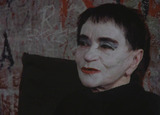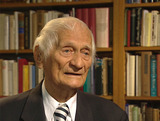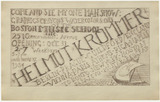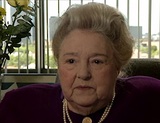Interview with the writer Roberto Schopflocher (2013)
“Flowing” from one language to the otherThe writer Robert Schopflocher, born in Fürth in 1937, tells of his exile in Argentina, which, in his own estimation, went "smoothly" for him. Initially pushed by his father into the profession of a farmer, he finally took a path as a writer.
Interview with Valeska Gert (1977)
Excerpt from Volker Schlöndorff's documentary film Nur zum Spaß, nur zum Spiel – Kaleidoskop Valeska GertThe dancer and actress Valeska Gert revolutionised the performing arts in 1920s Berlin and Paris. In Volker Schlöndorff's documentary Nur zum Spaß, nur zum Spiel – Kaleidoskop Valeska Gert from the year 1977, the 84-year-old artist described herself as “really and to be precise the wildest act back then”.
Interview with Volkmar von Zühlsdorff (2005)
Engaged for the American Guild for German Cultural FreedomIn 2005, Volkmar von Zühlsdorff, then 92 years old, gave this previously unreleased interview. In it, he talks about the foundation and responsibilities of the American Guild for German Cultural Freedom.
Invitation to Helmut Krommer’s one-man show in Boston, etching (October 1954)
The painter and graphic artist Helmut Krommer did not return to Germany after the collapse of the Nazi regime in 1945. After his period of exile in Czechoslovakia and England, the artist decided to spend his later years residing close to his daughters in the USA.
Invitation to the opening of an exhibition by László Moholy-Nagy (1934)
On 24 November 1934, an exhibition took place at the Stedelijk-Museum in Amsterdam showing works by László Moholy-Nagy, with the card above used as an invitation. Paintings, photograms, photomontages and stage set designs were presented at the exhibition.
Invoice from the municipality Sanary-sur-Mer sent to Hermann Kesten (1933)
Before fleeing to the United States in 1939, Hermann Kesten lived mostly in Paris, Amsterdam, Brussels and Ostend. He also spent some time in Nice and Sanary-sur-Mer on the French Riviera.
Irene Heymann on Paul Kohner and the European Film Fund (interview excerpt)
In 1938 the agent Paul Kohner, described by his long-time secretary Irene Heymann as a man with a big heart, founded the European Film Fund along with various German filmmakers already established in Hollywood, including Ernst Lubitsch, William (Wilhelm) Dieterle, Walter Reisch and Billy Wilder.Heymann recalled in an interview that, in the early days, Kohner forced his clients to donate part of their fee to the charity - later this levy became common practice.
Irmgard Keun: Nach Mitternacht (1937)
First edition of the novelIrmgard Keun’s novel Nach Mitternacht (“After Midnight”) was published in 1937 by the Dutch publishing company Querido Verlag, based in Amsterdam. It is seen as one of the most important fictional works in the genre of exile literature.
Itineraries. An interview with Emine Sevgi Özdamar, 2012
Language is one of the central themes in Emine Sevgi Özdamar's literature. Time and again, she engages with the importance of one's mother tongue when moving towards a new language.
Iwan Heilbut: Die Überlebenden (Zugvögel) [The Survivors (Birds of Passage)], typescript (1942/43)
Ivan Heilbut’s novel Die Überlebenden (literally “The Survivors”), published in 1943 by the American company Doubleday, Doran & Co. under the title Birds of Passage, is based on the author’s own experiences in France between 1939 and 1940.










![Typescript: Iwan Heilbut, Die Überlebenden [Birds of Passage] Typescript: Iwan Heilbut, Die Überlebenden [Birds of Passage]](/KIE/Content/EN/Images/objects/heilbut-iwan-die-ueberlebenden-en.jpg?__blob=thumbnail&v=2)
